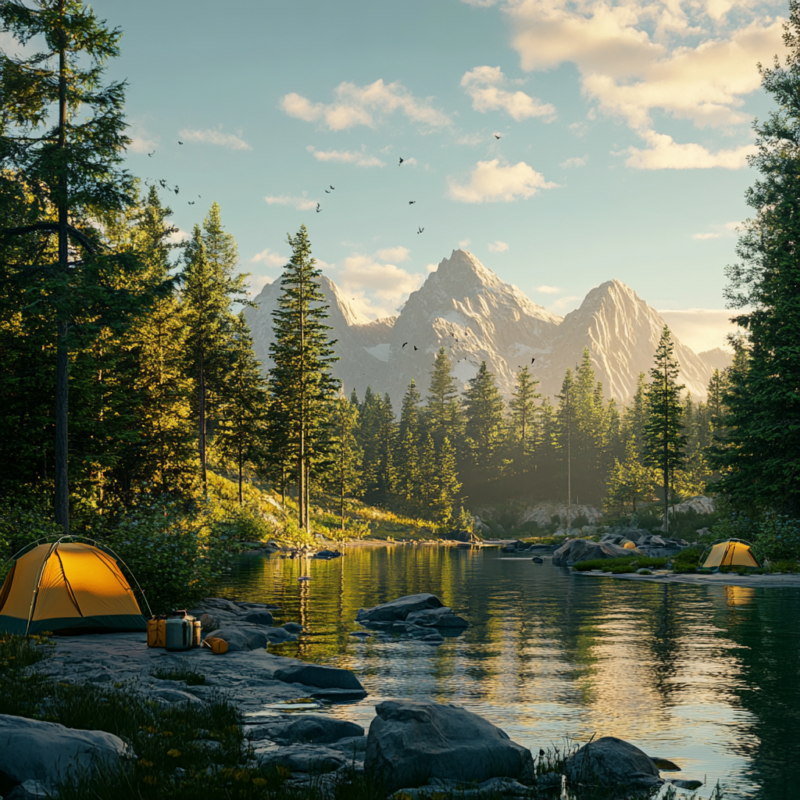As outdoor enthusiasts, we cherish the natural world and the experiences it offers. However, our beloved wilderness is facing an unprecedented threat: climate change. This global phenomenon is reshaping the landscapes we explore, altering ecosystems, and challenging the very essence of outdoor recreation. But there’s hope. As campers, hikers, and nature lovers, we are uniquely positioned to make a difference. Let’s explore how climate change is impacting camping and outdoor activities and, more importantly, how we can contribute to positive change.
Understanding the Impact of climate change on camping
Changing landscapes
Climate change is not a distant threat; it’s happening now, and its effects are visible in many of our favorite camping destinations:
- Shifting seasons: In some areas, earlier springs and later falls extend the camping season. While this might seem like good news for outdoor enthusiasts, it’s disrupting natural cycles and ecosystems.
- Reduced snowpack: In mountainous regions, diminishing snowpack affects water availability and changes the character of alpine environments.
- Extreme weather events: More frequent and intense storms, heatwaves, and droughts make outdoor activities less predictable and potentially more dangerous.
- Wildfire risks: Increased temperatures and drier conditions cause more frequent and severe wildfires, threatening campsites and hiking trails.
Biodiversity changes
Climate change is also altering the distribution and behavior of plants and animals:
- Shifting habitats: As temperatures warm, species move to higher elevations or latitudes, changing the composition of ecosystems we encounter while camping.
- Invasive species: Warmer temperatures allow non-native species to thrive in new areas, potentially outcompeting native flora and fauna.
- Phenology shifts: Changes in the timing of natural events (like flowering or migration) can disrupt food chains and ecosystem balance.
- Biodiversity hotspots: These areas of high species richness and endemism are particularly vulnerable to climate change and could potentially lose their unique characteristics.
Infrastructure Challenges
Climate change is also affecting the physical infrastructure that supports outdoor recreation:
- Trail erosion: Increased rainfall and flooding events are causing more frequent trail washouts and erosion.
- Campsite closures: Rising sea levels and more intense storms threaten coastal campsites, while increased fire risks lead to more frequent closures in forested areas.
- Access issues: Extreme weather events can damage roads and bridges, making it harder to reach remote camping areas.
How campers can make a difference
As outdoor enthusiasts, we have a unique opportunity – and responsibility – to be part of the solution. Here are some ways we can help:
1. Practice and promote sustainable camping
- Leave no trace: Follow and teach others about Leave No Trace principles. This includes properly disposing of waste, respecting wildlife, and minimizing campfire impacts.
- Choose eco-friendly gear: Opt for durable, sustainable products when shopping at camping equipment shops. Look for gear made from recycled materials or produced by companies with strong environmental commitments.
- Reduce single-use plastics: Bring reusable water bottles, food containers, and utensils instead of disposable options.
2. Support conservation efforts
- Volunteer: Participate in trail maintenance, habitat restoration, or citizen science projects in the areas where you camp.
- Donate: Support organizations working to protect natural areas and address climate change.
- Advocate: Use your voice to support policies that protect public lands and address climate change. Write to your representatives or join local environmental groups.
3. Make sustainable transportation choices
- Carpool: When heading to campsites, share rides with friends to reduce emissions.
- Choose nearby destinations: Explore local camping options to reduce long-distance travel.
- Use public transportation: Where available, use shuttle services or public transport to access popular camping areas.
4. Educate yourself and others
- Stay informed: Keep up-to-date on climate science and its impacts on the outdoors. Share this knowledge with fellow campers.
- Engage in discussions: Use your camping experiences to start conversations about climate change with friends and family.
- Support outdoor education: Participate in or support programs that teach children about nature and conservation.
5. Adapt your camping practices
- Be flexible: Be prepared to change your plans due to extreme weather or wildfire risks.
- Camp in the off-season: Consider camping during shoulder seasons to reduce impact during peak times and enjoy a quieter experience.
- Practice water conservation: Even in areas where water seems abundant, use it wisely to reduce your impact on local ecosystems.
6. Support sustainable tourism
- Choose eco-friendly campgrounds: Support campsites that prioritize sustainability and conservation.
- Respect local communities: When camping in or near populated areas, support local businesses and respect community guidelines.
- Visit lesser-known areas: Help reduce the pressure on popular camping spots by exploring less-visited areas, spreading out the impact of tourism.
7. Embrace technology responsibly
- Use apps for good: Utilize apps that help you identify plants, track wildlife sightings, or report trail conditions to contribute to citizen science efforts.
- Minimize electronic use: While some tech can be helpful, try disconnecting as much as possible to reduce energy consumption and fully immerse yourself in nature.
8. Plant trees and support reforestation
- Participate in tree planting: Join or organize tree planting events in your local area or regions where you frequently camp.
- Support reforestation projects: Donate to or volunteer with organizations conducting large-scale reforestation efforts, particularly in areas affected by wildfires or deforestation.
9. Practice sustainable campfire management
- Follow local regulations: Always adhere to fire bans and restrictions.
- Use established fire rings: When allowed, only build fires in designated areas to minimize impact.
- Burn responsibly: Use dry, dead wood and keep fires small. Fully extinguish fires before leaving the site.
10. Engage in climate-friendly food practices
- Reduce meat consumption: Consider plant-based meal options when camping to reduce your carbon footprint.
- Buy local: When possible, purchase supplies from local sources near your camping destination to support local economies and reduce transportation emissions.
- Minimize food waste: Plan meals carefully to reduce waste and properly store food to avoid attracting wildlife.
The power of individual action
It’s easy to feel overwhelmed by the scale of climate change but remember that every action counts. As outdoor enthusiasts, we have a powerful voice. Our experiences in nature give us a unique perspective on the changes occurring in our environment. Sharing these experiences and taking action can inspire others and contribute to broader societal changes.
Moreover, our actions can have a ripple effect. When we practice sustainable camping, we not only reduce our own impact but also set an example for others. A simple conversation about eco-friendly gear at a campsite can inspire fellow campers to make more sustainable choices. Our enthusiasm for protecting the places we love can motivate friends and family to get involved in conservation efforts.
Looking to the future
As we face the challenges of climate change, it’s crucial to remain hopeful and proactive. The outdoor community has always been at the forefront of environmental conservation, and we must continue this legacy. By adapting our practices, supporting conservation efforts, and spreading awareness, we can help preserve the natural world for future generations of campers and outdoor enthusiasts.
Remember, every time we step into the wilderness, we have an opportunity to be stewards of the environment. Let’s embrace this role and work together to protect the landscapes we love. The future of camping – and our planet – depends on the actions we take today.
So, the next time you plan a camping trip, pack your gear, or sit around a campfire, consider the small changes you can make to help combat climate change. Every action, no matter how small, is a step towards preserving the great outdoors for generations to come. Let’s camp responsibly, tread lightly, and be the change we wish to see in the world.



